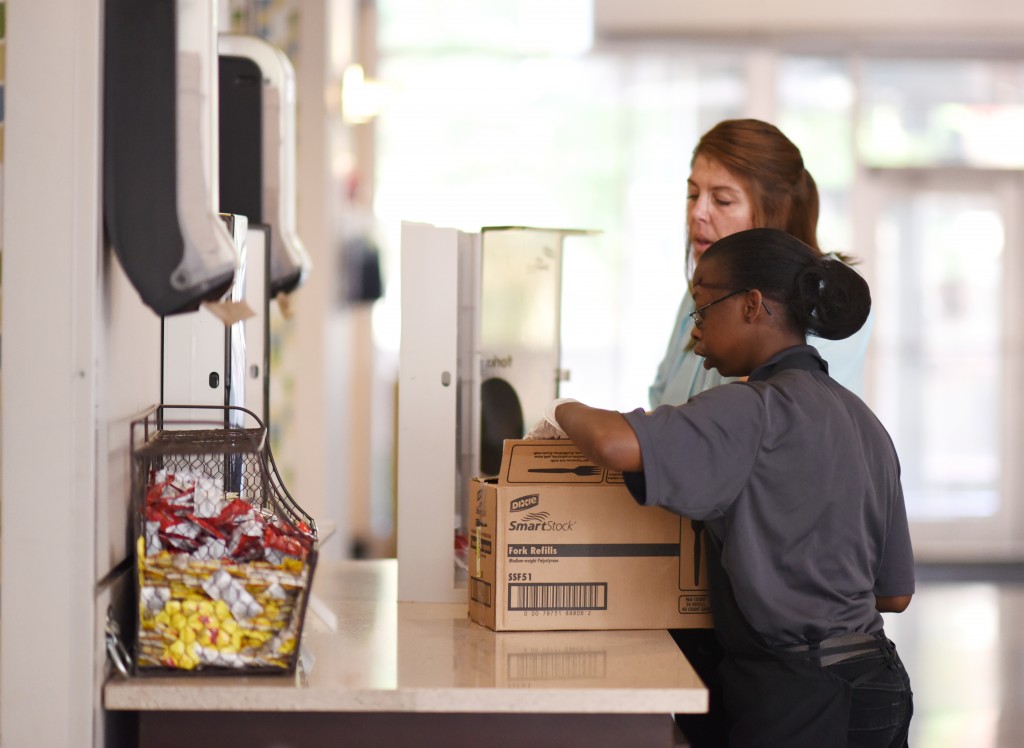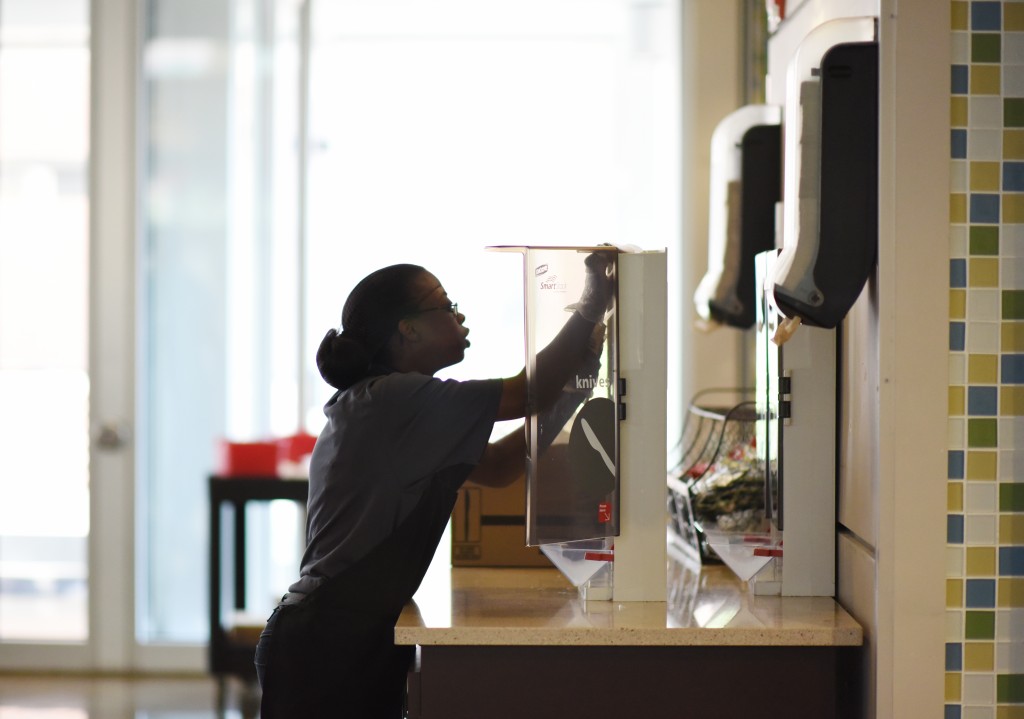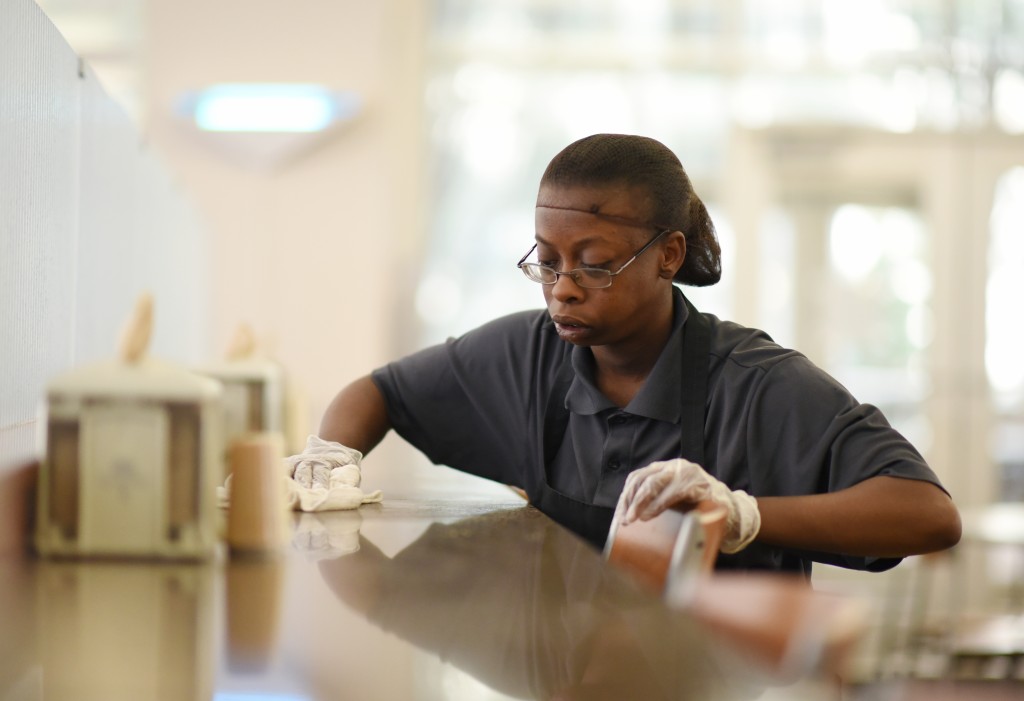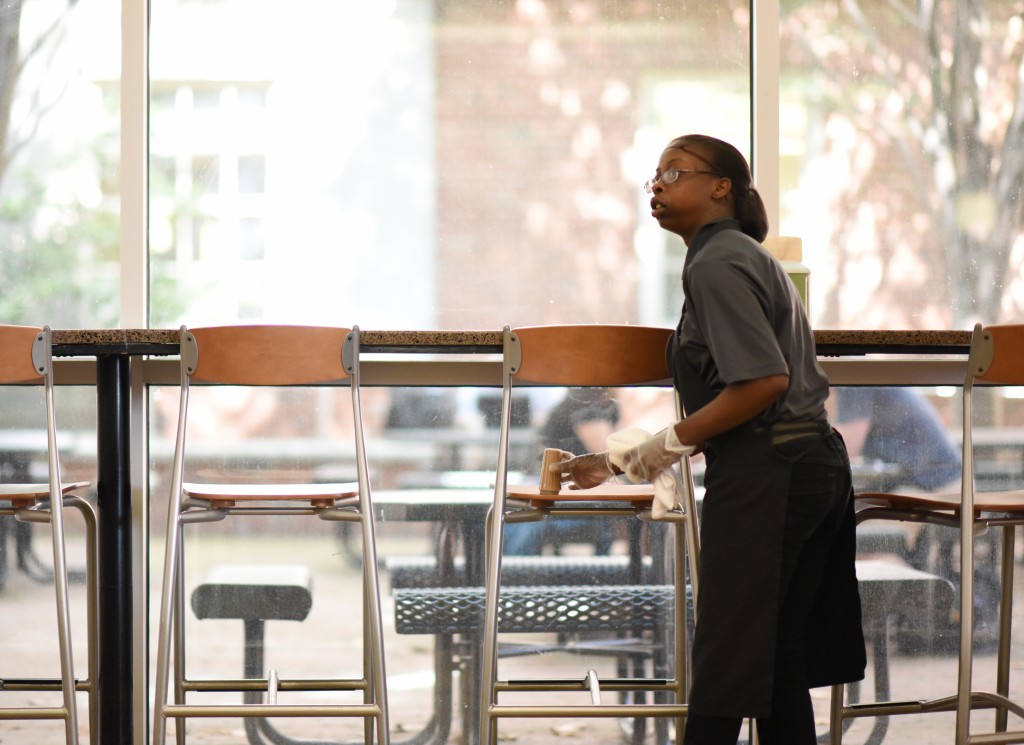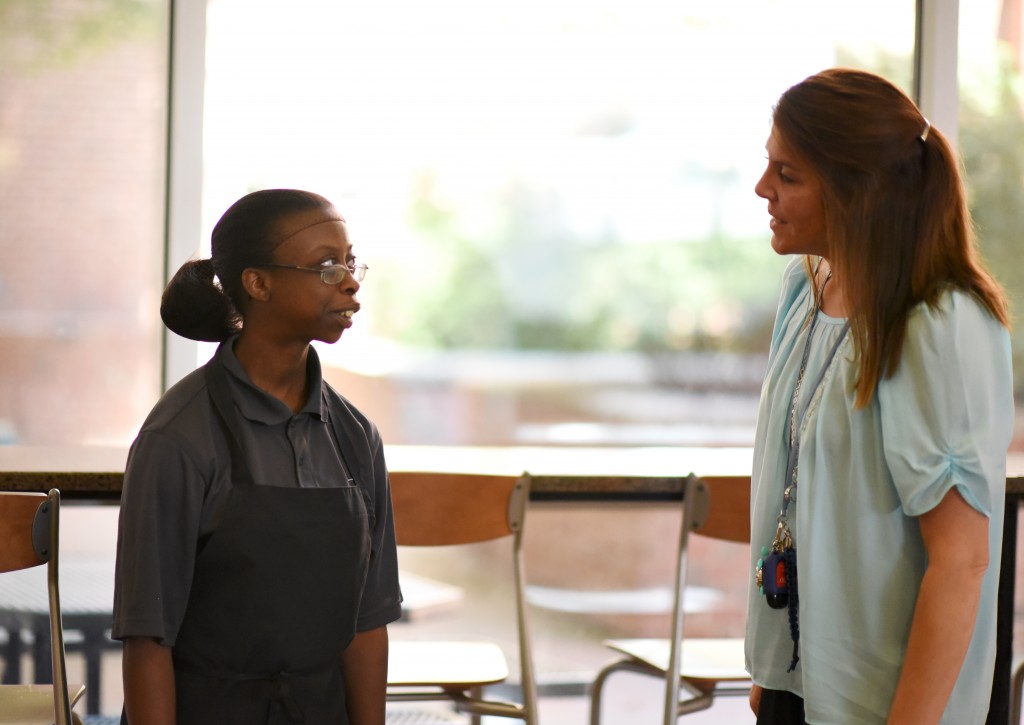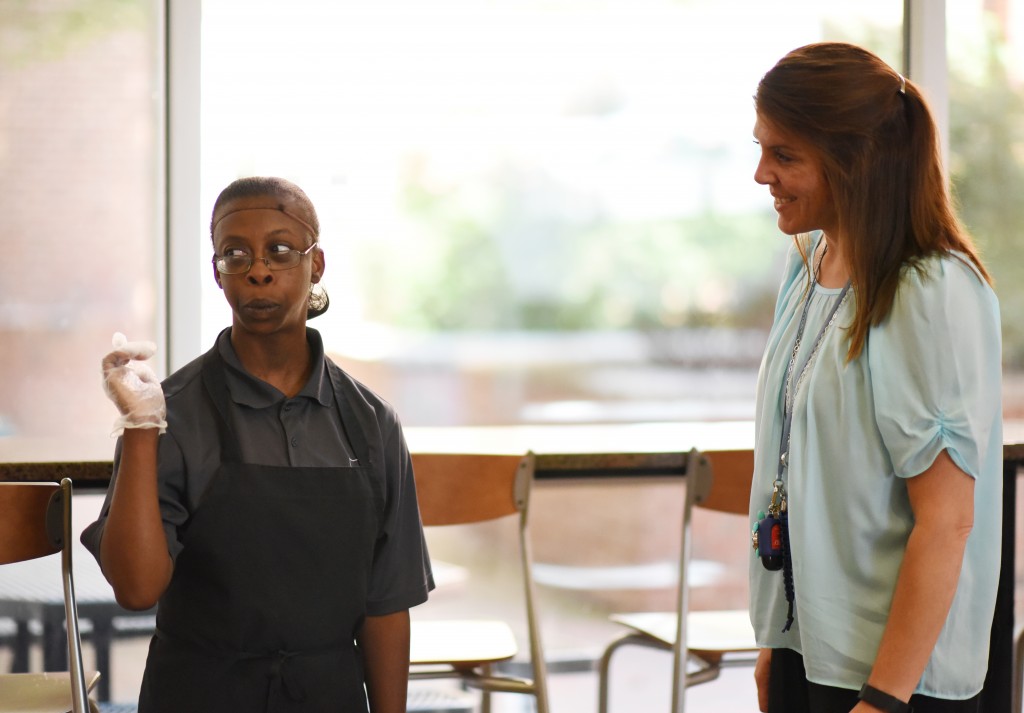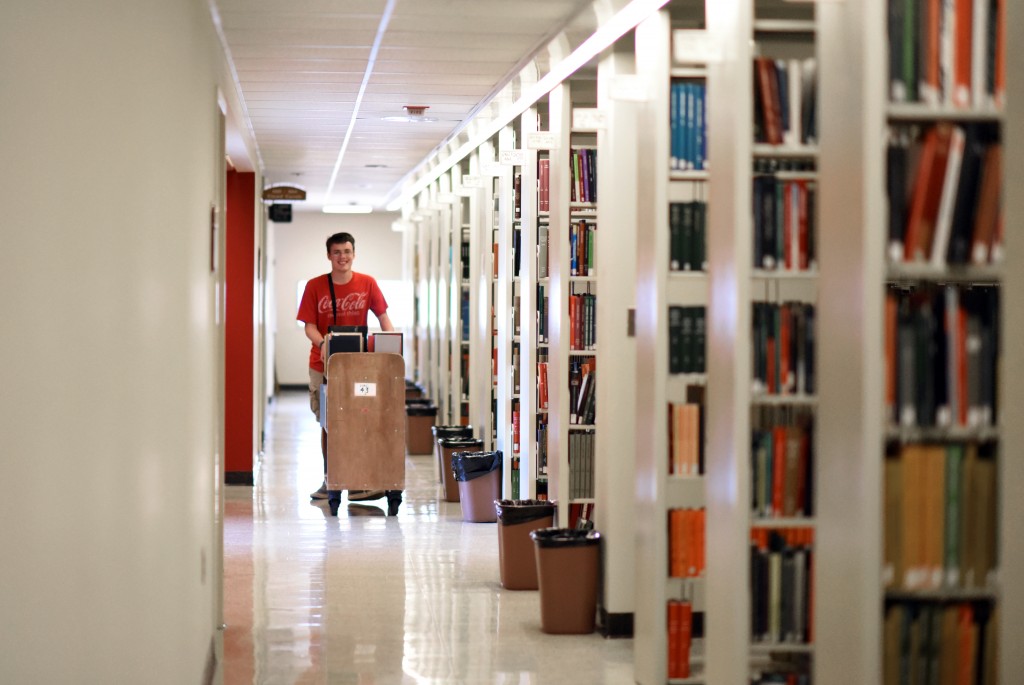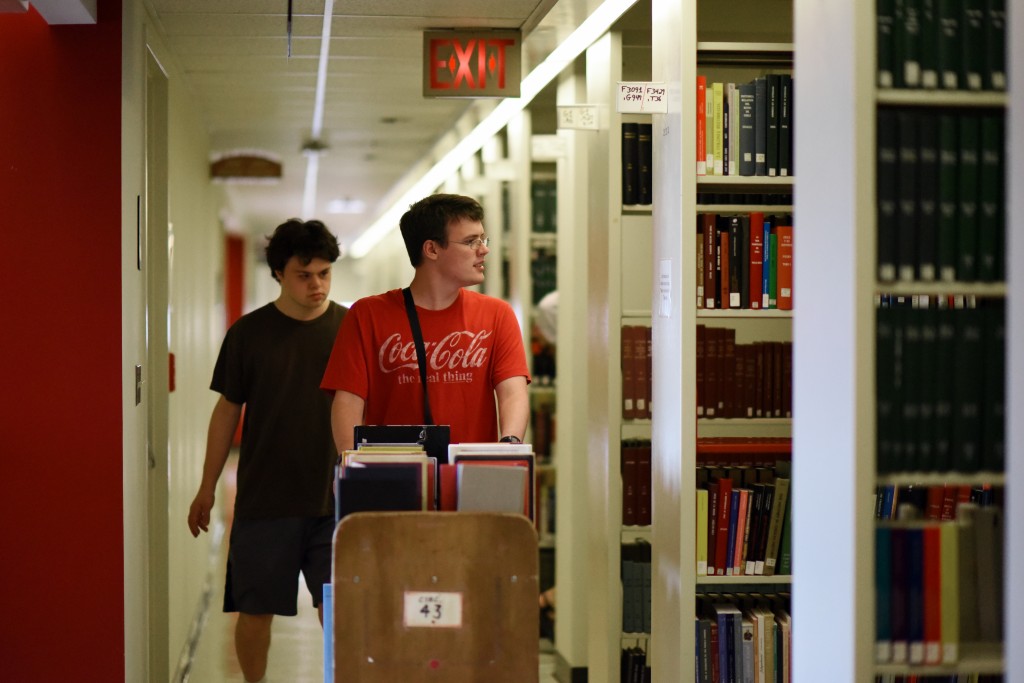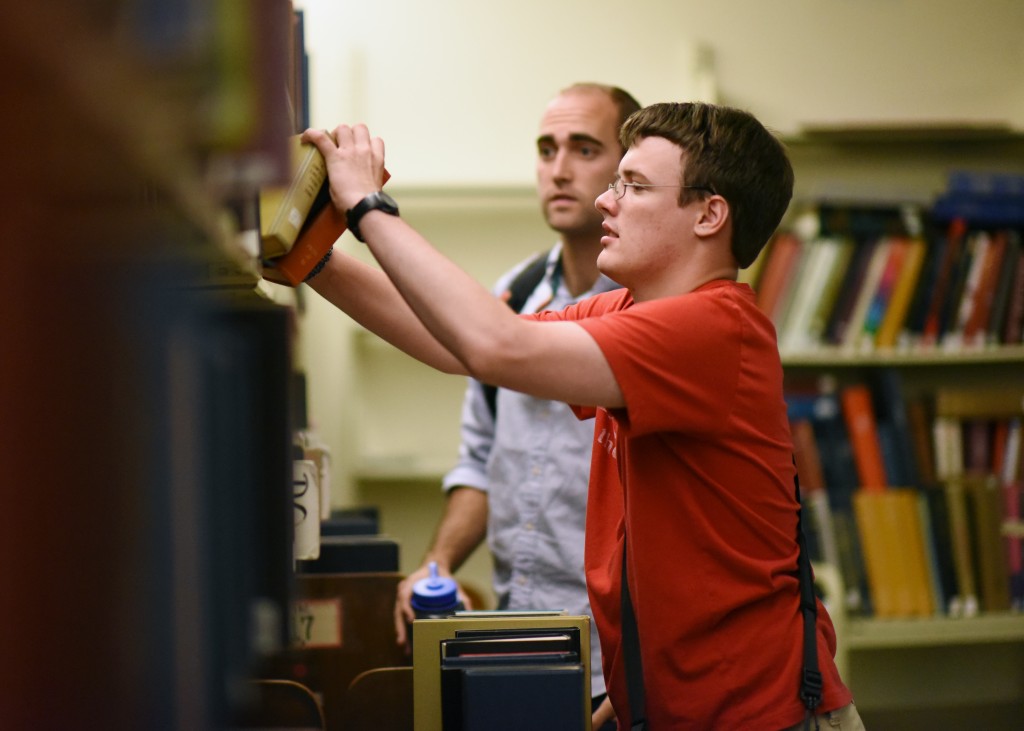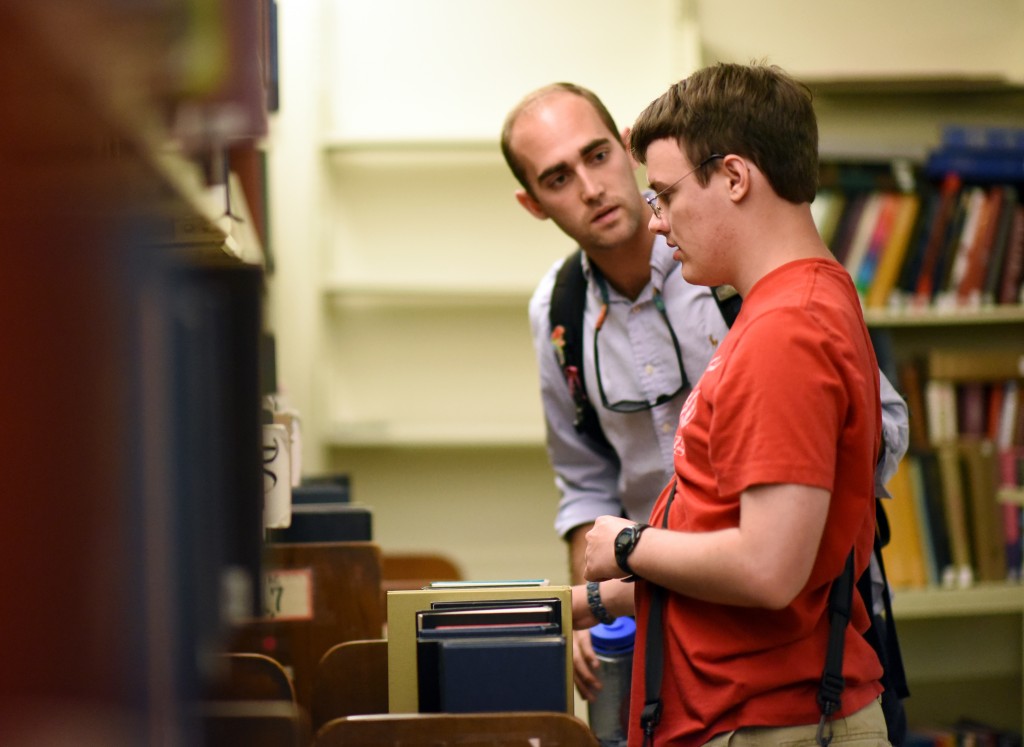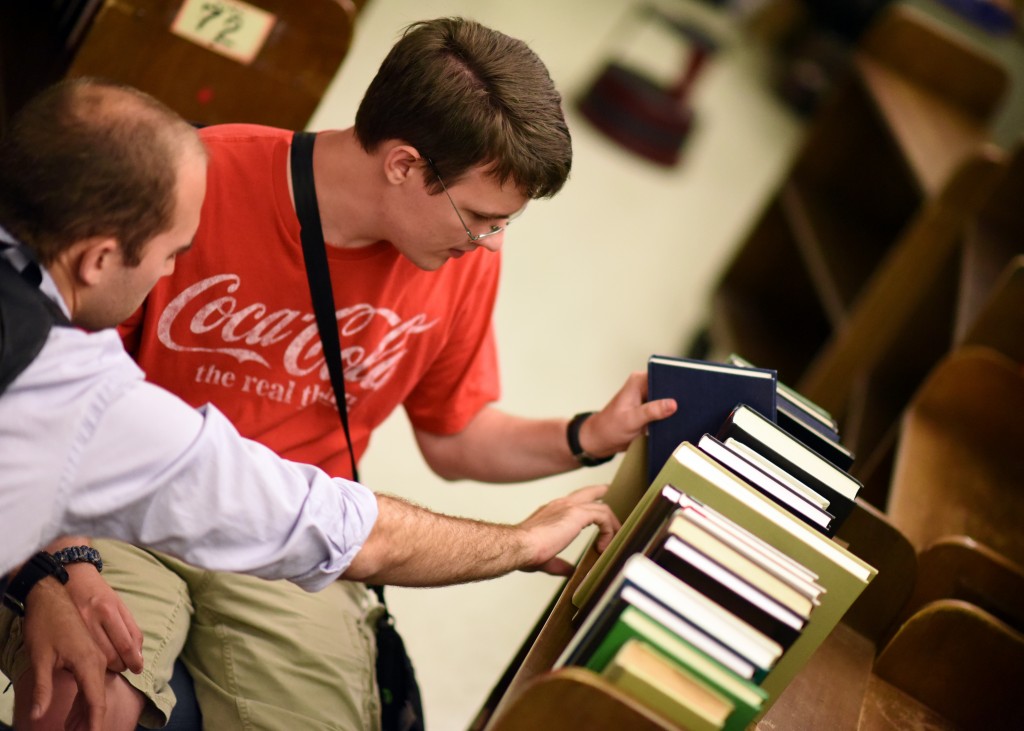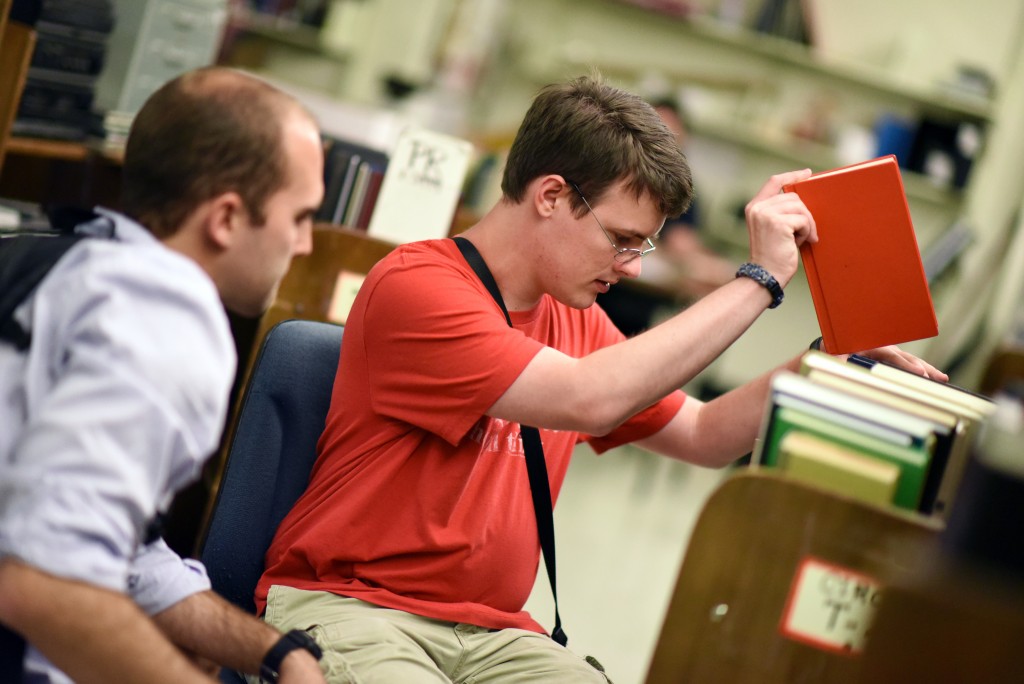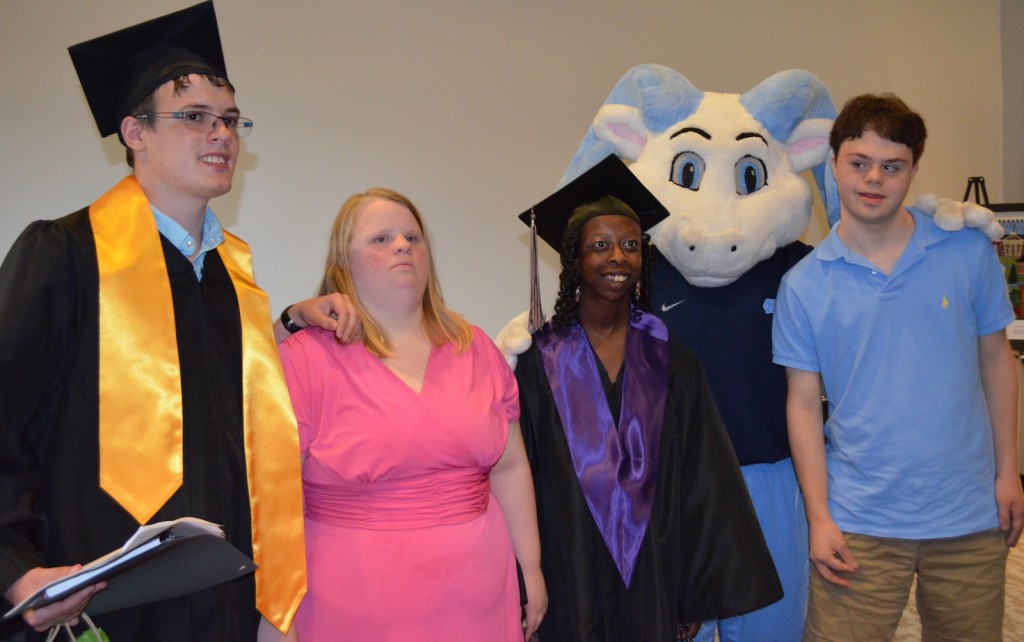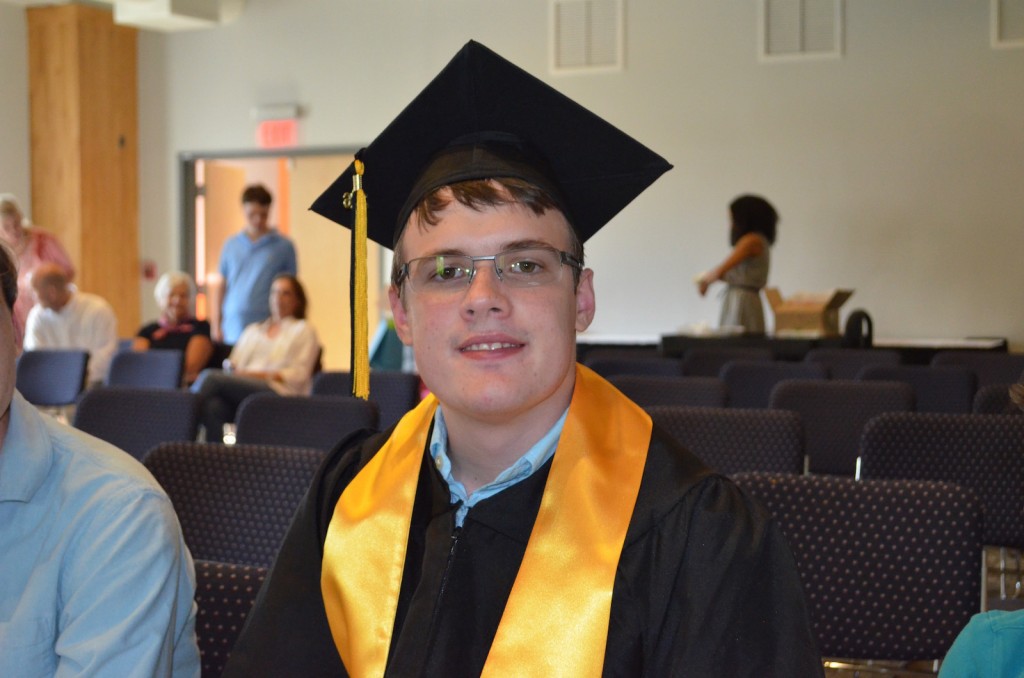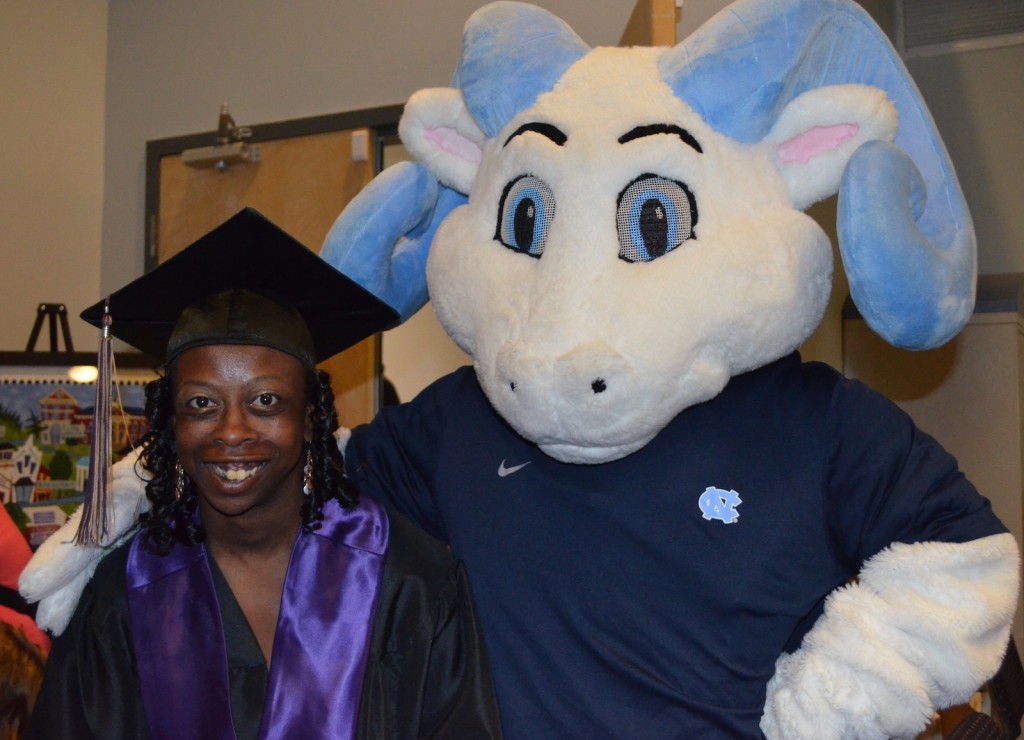On June 1, the first two graduates of the innovative PATHSS program were recognized on the Carolina campus. In a unique partnership between UNC-Chapel Hill and the Chapel Hill-Carrboro City Schools, PATHSS is designed to help high school students with intellectual and developmental disabilities prepare for life after high school.
Meredith Weiss, senior associate vice chancellor for Finance and Administration at Carolina, and Susan Lombardo, transition facilitator with Chapel Hill-Carrboro City Schools, knew Dana Hanson-Baldauf, who has a background in special education and whose doctoral research focused on meeting the everyday needs of young adults with intellectual or developmental disabilities.
Weiss and Hanson-Baldauf were in the same doctoral program and had examined employers’ perspectives in hiring people with intellectual and developmental disabilities. In addition, Hanson-Baldauf has a sister with special needs, so her knowledge bridges both practical and professional perspectives.
As she and Lombardo discussed how to shape a program like PATHSS, Weiss put them in touch with people on the University side to explore potential resources. A missing piece of the puzzle, however, was how a new program would be funded. That’s where parent advocate Adela VanName became indispensable.
As the parent of a special needs student, VanName well understood the importance of preparing these students for independent living beyond high school. She was the founding chair of the school system’s collaborative Special Needs Advisory Council and later co-chaired an exceptional children’s high school vocational education working group with Lombardo, who later brought in Hanson-Baldauf.
VanName cultivated both broad parent interest and school system support, and she approached the Oak Foundation to fund the pilot program.
She credits much of the success in launching PATHSS to widespread support from the school system, including that of Superintendent Tom Forcella and staff in the Exceptional Children program, particularly Senior Executive Director Sherron Leplin and Assistant Director Spencer Register, who was the lead administrator for PATHSS. “We wouldn’t even have a conversation about a program like this without their support,” VanName said.
The program took shape with guidance from Lombardo, who helped provide content expertise; Weiss, who along with Noreen Montgomery from the Office of Human Resources, helped establish the UNC connection; and Hanson-Baldauf, who developed the various University components and orchestrated the program’s activities.
“The immediate collaboration between the school district and UNC to say, ‘hey, this is a great idea that will address a critical need,’ has been amazing,” VanName said.
Now, with a combination of school district funding and continued support from the Oak Foundation, PATHSS is ready to move beyond the pilot phase and help the next class of students prepare for the future.
Weekday mornings, the students head to a small meeting room in Manning Hall where they meet with the program facilitator before checking their email and mapping out the day’s activities. Their days begin with a familiar routine.
Brian O’Donnell methodically graphs the weather forecast on the board and Hannah Barlow adds any updated or missed information for the week. Jake Gerber completes his bank deposit form and selects the afternoon’s bus schedule, while Brittany Newby gets down to business scheduling EZ Rider for her after-school events or Special Olympics practices.
Shortly after 9 a.m., the students and their job coaches head to their campus job sites for their morning externships. They take on a variety of tasks, from sorting books by call number to be re-shelved in Davis Library, to setting up for seminars and sorting and delivering mail in Geological Sciences, to clearing tables and stocking condiments in one of the Carolina Dining Services facilities. At noon, they regroup for lunch and a little down time.
Both Hannah and Brittany have been a great addition to our team this semester. They are hard workers and were able to take additional responsibilities as the semester progressed. Not only did the management team enjoy having them with us, but the employees did as well. We look forward to having Hannah back in the fall and wish Brittany a happy graduation and best of luck.
–Megan Phelps, Aramark
Afternoons focus on hands-on learning, either in a classroom or a community setting that’s affiliated with a UNC program or department. Throughout their busy days, the students are learning both practical job skills and life lessons, all the while connecting what they learn with what is meaningful to them and will help them become independent.
While these four students spend much of their weekdays on campus, they aren’t Carolina students. They are high school students from Chapel Hill-Carrboro City Schools who are part of a groundbreaking program called PATHSS – Project Achieve for Transitioning High School Students. PATHSS is a program designed for high school students, ages 18 to 22, with intellectual and developmental disabilities who are in their final two years of high school and are about to make the transition from student life to adulthood.
These students are absolutely amazing, and working with them has been such a rewarding experience!
–Dana Hanson-Baldauf, PATHSS
“The program is a transition immersion for students with disabilities, a classroom within the community,” said Susan Lombardo, transition facilitator with the school system. PATHSS evolved from the recognition that these students weren’t adequately prepared for life after high school, she said, so parents, school administrators and community members came together to create a workable solution in the face of shrinking resources.
Under federal law, students with certain disabilities are allowed to remain in high school until age 22, but too often they leave high school without the life skills they need to function in the broader community. Post-secondary programs for students with disabilities exist in some community colleges and universities, but these programs are not geared for high school students. After exploring other transition programs, PATHSS was developed to go beyond the typical classroom experience to help the students develop skills for independent living.
With an emphasis on marketable job skills, PATHSS blends rigorous vocational training with classroom and community-based instruction. “We know that individuals with disabilities who are self-determined are more likely to achieve successful adult outcomes,” Lombardo explained. “Through PATHSS, our externs develop behaviors that are goal-directed and self-regulated. They make things happen in their lives.”
New experiences and skills
PATHSS, which is completing its pilot phase, relies on a unique partnership between the local school system and the University.
Jake and Brian have been diligent, hard workers here at Davis. Their duties have been daily clearing, sorting and scanning of books. This type of task is a constant need in the library, and we are lucky to have their assistance. Over the past few years, Davis has lost several staff positions due to budget issues and retirement. Having reliable workers like Jake and Brian has enabled the remaining staff and students to focus more on other aspects of their jobs.
–Ed Larson, Davis Library
The students have rotated their work experiences across the University in areas including the Department of Athletics, Davis Library, Geological Sciences, Student Stores Warehouse, Facilities Services Human Resources, Carolina Dining Services, the Department of Undergraduate Education and the Penny Lane Farm.
This semester, O’Donnell and Gerber spent the mornings pushing their carts through each floor of the Davis Library stacks to collect discarded books before they scanned them into the computer system for re-shelving. Newby and Barlow headed to Lenoir Dining Hall, where they cleared tables and generally tidied up as necessary.
Two afternoons a week, they switched gears for different experiences.
O’Donnell headed off campus to care for the puppies at the Penny Lane Puppy Development Center, part of UNC’s Center for Excellence in Community Mental Health. He cleaned delicate puppy ears, pitched in doing laundry and accompanied the puppies outside the farm as they learned to socialize as part of their service training.
Gerber went to the Loudermilk Center for Excellence, where he helped set up for various athletic events and break things down afterward. He was there to lend a hand for whatever was needed, from taking inventory of supplies to preparing a list of things to be ordered for his supervisor.
I got to know the students by having lunch with them, and I knew I had to get involved with them. I am Brittany’s mentor, but I really think of her as part of my family.
–Trevaughn Eubanks, Finance and Administration
Newby, who has an affinity for office work, helped with filing and other clerical tasks for Facilities Services Human Resources. Her mentor, Trevaughn Eubanks, said Newby’s confidence in her work has grown tremendously through her experience. “I don’t want anyone to take that away from her – ever,” said Eubanks, executive assistant to the vice chancellor for Finance and Administration.
Barlow used her afternoons to tackle improving her reading and writing skills with the University’s Center for Literacy and Disabilities Studies. The plan for next year is to expand her workday so she can build on all that she has learned this year.
Whether they are at work or in class, the students are constantly honing daily life skills: using public transportation, banking, writing letters, doing laundry and learning about personal safety among other activities. Each week involves something different.
The UNC community also lends a hand.
Students in the Best Buddies program have joined the high school students for lunchtime camaraderie and other activities, and several students from the Division of Occupational Studies completed their field experiences by working with the PATHSS students to identify specific needs and develop action plans. Students in the School of Information and Library Science and the Gillings School of Global Public Health also have undertaken projects related to some of these needs.
One of the best aspects of PATHSS is the way it builds opportunities for all disabled people in the community.
–Spencer Register, Chapel Hill-Carrboro City Schools
Every month, the Department of Public Safety sends Sgt. James David to talk about safety and first aid issues, and Project STIR (Steps Toward Independence and Responsibility) trainers have focused on self-advocacy skills. UNC Visitors’ Center staff members have taught the students about campus landmarks and history.
“Early on, we knew we needed an entity like the University because of its employment opportunities and resources, and that support has been vital to the program’s success,” Lombardo said.
The success is really a two-way street because the University community learns firsthand about people with different needs, and the high school students gain important training to prepare them for the workforce, said Meredith Weiss, senior associate vice chancellor for finance and administration.
“Having the PATHSS students on our campus enriches our community overall,” she said. “Whenever we have an opportunity to become more diverse and more inclusive, everyone benefits.”
Research shows that employees with intellectual or developmental disabilities bring strengths to the workplace, including a positive attitude and strong work ethic, attributes that benefit the entire work climate.
“What it boils down to, really, is that the more we learn to respect people from all backgrounds, understand our differences and appreciate our unique contributions, the better we become,” Weiss said.
Opportunity and connection
Dana Hanson-Baldauf said PATHSS is really about opening doors.
“The students’ sense of self-empowerment and self-determination is evident,” she said. “They are learning practical skills and no longer feel disconnected from the rest of the population. They really like to work and they work hard. It is so gratifying to see the students wow their supervisors, all of whom have welcomed us back because they see firsthand the contributions our students make.”
We had so much filing piled up that there was some question as to whether the students would finish the project before the end of their externship. Not only did they finish well ahead of schedule, they were eager for more work to do to help out. The students quickly became valued members of our team, not just professionally but personally as well. I’m very thankful for the lasting relationships that formed between the HR staff and the PATHSS students.
–Tracy Agnew, Facilities Services Human Resources
A key part of that response is because of job coaches Brooks Covington and Tabitha McKean and their commitment to the students and the goals of the program, said Hanson-Baldauf, who orchestrates the students’ many activities. The two coaches are on site with the students throughout their externships.
“Everyone on campus has been so welcoming and supportive, and has really gotten what we’re trying to do,” she said. “I don’t think I’ve ever been told no by anyone here.”
That includes the School of Information and Library Science. “Dean Marchionini has welcomed our program and given us a home base to work from, and the school has supported us in so many ways” Hanson-Baldauf said.
Gerber and Barlow will return to PATHSS next year, joined by three new students. O’Donnell and Newby graduated on June 1 and now have a chance to put all that they’ve learned into practice.
O’Donnell already has a job lined up at Walgreens on East Franklin Street, and he’ll continue to work at Davis Library through the summer and volunteer at Penny Lane. Several times a week, he’ll also head to OE Enterprises in Hillsborough to work on site there.
Newby is deciding between two programs: one through the Career College at Alamance Community College that focuses on health care or another through Work Source East in Goldsboro that provides training in retail or food services.
Whatever the future holds, the skills and self-awareness these students have gained through PATHSS will help them succeed.
